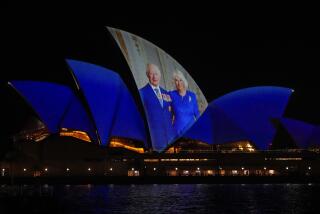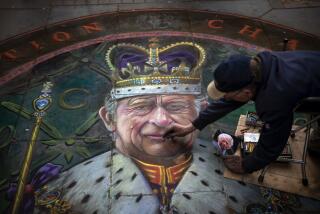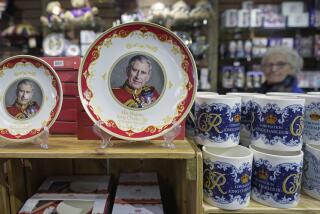British Monarch Eagerly Awaited : Queen’s Visit to China: A Dramatic Turn in History
- Share via
PEKING — England consists merely of three islands, simply a handful of stones in the Western Ocean. Her area is estimated to be about the same as Taiwan and Hainan island. . . . Even if the soil is all fertile, how much can be produced locally? --From a 19th-Century Chinese geography text
In 1596, Queen Elizabeth I dispatched a letter to China, addressed to the Ming Dynasty Emperor Shen Zong that sought to establish trade between her kingdom and the fabled Empire of Cathay. The letter was apparently lost in a shipwreck, and she received no reply.
Nearly two centuries later, in 1793, an emissary of King George III traveled to Peking bearing gifts in an effort aimed at lifting China’s barriers to trade with the West. The Chinese Emperor Qianlong loftily declined.
“We have never valued ingenious articles,” the emperor said, “nor do we have the slightest need of your country’s manufactures.”
But the British were not to be denied. In the 19th Century, at the height of their power, they peddled opium to China to pay for the tea and silk they bought; they fought two wars with China over opium; they burned and sacked the Imperial Summer Palace at Peking, and they took over the strategic island of Hong Kong and the adjacent mainland territory.
Now, this tawdry history is about to be put to rest. On Sunday, in what must be one of the most symbolic turnabouts in 20th-Century history, Queen Elizabeth II will begin the first visit ever by a British monarch to China--and China’s Communist regime will give her an extravagant welcome.
China has come down with a decidedly unrevolutionary case of royal fever. For the moment at least, the cadres of Peking and Shanghai seem to be as respectful of the queen as the most awe-struck families of Yorkshire.
At weekly Foreign Ministry briefings, press spokesman Ma Yuzhen--a dedicated reflector of official views who, a decade ago, sobbed uncontrollably at the death of Mao Tse-tung--volunteers regular updates on the upcoming travel plans of “Her Majesty.”
In Shanghai, China’s largest clock, atop the city’s Customs Building, has just been repaired so that it once again chimes the hour in the manner of “Big Ben” in London.
When it was built in 1927, the Shanghai clock had chimed as Big Ben did, but during the Cultural Revolution of the late 1960s, it was damaged and was replaced by 40 loudspeakers that sounded the refrain of “The East is Red.” A recent article by the New China News Agency quoted a Chinese technician as saying the repairs were done to “make Queen Elizabeth feel at home when she visits Shanghai.”
In Peking, workmen have just put the finishing touches on a completely reconstructed 75,000-square-foot villa on the grounds of the Diaoyutai State Guest House, where official visitors are lodged. The queen will have a pool, a billiard room and a gym at her disposal.
In the southwestern city of Kunming, recent visitors say, the old residence of a former warlord has been redone for the queen. In Xian, China’s one-time capital, roads have been repaved so that Her Majesty will have a smooth ride on her visit to see the famed terra cotta warriors. And, in Shanghai, the potholes in the road from the airport to downtown have at last been filled in.
Chinese newspapers and magazines and bookstores are filled with newly written materials explaining the life and background of the yinguo nuwang , or the British queen.
“The queen is very famous among the common English people,” the newspaper China Youth News said Saturday. “Elizabeth is always simply dressed and unassuming. . . . She is the richest person in the country, but she is very thrifty and lives simply.”
Last week, a picture of the queen, wearing a diamond crown, appeared on the cover of the magazine World Affairs Pictorial, and this week newsweeklies are carrying extensive pictures and reports on the queen and royal family.
Until two years ago, none of this would have been possible. China remained bitter that Britain, by virtue of the “unequal treaties” of the 19th Century, was continuing to occupy what it considered to be Chinese territory in Hong Kong, and it often tailored its rhetoric accordingly.
An English-language textbook published by Peking University in 1979 referred to the British monarch as a “relic.”
“You may be surprised that the bourgeoisie still tolerates a monarch at the head of state,” the textbook said. “In fact, the monarch, who is presently a queen, is quite handy for the bourgeoisie to use on state occasions such as the opening of Parliament every autumn. . . . The pomp and ceremony attached to these occasions lend a majestic impression to the deeply immoral dealings of capitalism.”
But, in 1984, Britain agreed to the deal under which Hong Kong will be returned to Chinese sovereignty in 1997, in exchange for China’s pledge not to interfere with Hong Kong’s capitalist system for 50 years after the turnover.
Chinese leader Deng Xiaoping extended the invitation for the queen to visit in the summer of 1984, just as the detailed negotiations over Hong Kong were being concluded and after the British had already announced publicly that they would return the colony to China.
With the exception of Yugoslavia, the queen has never traveled to a Communist country. But her husband, Prince Philip, who will accompany her, has visited the Soviet Union, Poland, Hungary and Bulgaria.
Welcoming Ceremony
The people of Peking will get a chance to see the royal party Monday at a public welcoming ceremony in Tian An Men Square. In Shanghai, she is to take a walking tour.
Accompanying the queen and the prince will be the largest traveling entourage ever to accompany a royal visit. The visiting press corps will number more than 200, including 40 from the British Broadcasting Corp., which has arranged to broadcast news of the queen’s visit to the Great Wall live by satellite to television audiences back home.
From the British perspective, the practical motivation underlying all these efforts is the same one that drove the first Elizabeth to write her letter nearly four centuries ago: the desire for trade with the Middle Kingdom.
Just before the queen arrives in Shanghai to give a state banquet aboard the royal yacht Brittania, for example, the ship will be used for a “seminar” at which 120 British businessmen will make their pitch to their Chinese counterparts.
In recent years, Britain’s trade with China has lagged behind that of other major nations--and behind earlier British expectations.
Eight years ago, British and Chinese leaders agreed in principle to boost bilateral trade from the level of $400 million a year to $10 billion by 1985. In fact, according to Chinese statistics, trade with Britain last year amounted to only $1.4 billion.
This was not only far below China’s trade with Japan ($17 billion) and with the United States ($6.4 billion), but only half as much as China’s trade with West Germany ($2.8 billion), and less even than that with the Soviet Union ($1.9 billion).
From the Chinese perspective, the queen’s trip will be a journey of expiation and a commemoration of the Hong Kong agreement. It will also serve as a vivid symbol of the fact that China is being accepted, recognized and courted by the Western powers that only a century ago were exploiting her weakness.
“At last, a British monarch comes to pay tribute to the Middle Kingdom,” one British official said. “I really think that has a lot to do with all the excitement.”
The Chinese fascination with the British queen is also a reflection of the fact that, despite the many differences between their countries, China and Britain share some common interests. By American standards, both cultures place a premium on hierarchy and decorum.
In 1844, in a memo to the Chinese Emperor Tao Kuang on methods for “handling the barbarians,” an imperial adviser, in a reference to Queen Victoria, explained with some surprise that “the English barbarians are ruled by a female.”
But the adviser, Chiying, seemed even more amazed by the United States. “The ruler of the American barbarians is established by the campaigning of his countrymen, and is changed once in four years,” he wrote. “After he leaves the position, he is of equal rank with the common people.”
More to Read
Sign up for Essential California
The most important California stories and recommendations in your inbox every morning.
You may occasionally receive promotional content from the Los Angeles Times.













